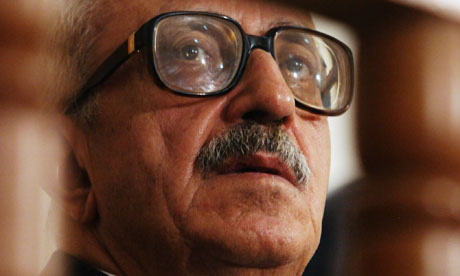Iraqi president refuses to sign Tariq Aziz’s execution order
by editor | 18th November 2010 7:20 am
![]()
It is unclear whether Jalal Talabani’s opposition is enough to prevent execution of Saddam Hussein’s former deputy
Haroon Siddique

Iraq’s president, Jalal Talabani, refused today to sign the execution order for Tariq Aziz, Saddam Hussein’s former deputy, who was sentenced to death last month.
Aziz, the international face of Saddam’s government, was convicted on charges relating to a campaign of persecution against members of the Shia opposition parties, including that of the current prime minister, Nouri al-Maliki.
“No, I will not sign the execution order for Tariq Aziz, because I am a socialist,” Talabani told French television France 24 in an interview.
“I sympathise with Tariq Aziz because he is an Iraqi Christian. Moreover he is an old man who is over 70.”
His comments come after a series of vicious attacks on Iraq’s Christians that have prompted many members of the religious minority to consider fleeing the country. In the most serious incident, more than 50 people were killed by gunmen inside a Catholic church in Baghdad.
Aziz, 74, was the highest-ranking Christian in Saddam Hussein’s inner circle. It is unclear whether Talabani’s opposition could prevent the sentence being enforced, given that his apparent refusal to sign Saddam’s execution order did not save the dictator.
A leading Iraqi lawyer said he believed Aziz’s death sentence could not legally be carried out without the president’s signature on the execution order.
“According to the Iraqi constitution, the president of the state has the power to ratify death sentences before they are carried out,” said Tariq Harb.
Aziz had earlier been sentenced to 22 years in jail for complicity in a bloody crackdown on merchants accused of price tampering, and a campaign against Kurds in Iraq’s north.
In the long-running case for which he received the death penalty, he was accused of being part of a campaign of persecuting, killing and torturing members of the Shia opposition and religious parties banned under Saddam, including Maliki’s Shia Dawa party.
Aziz’s supporters argue that he was not responsible for the crimes he is accused of but is being persecuted simply because he was a member of Saddam’s regime.
The Vatican and Russia have both called on Iraq not to carry out the execution of Aziz, as has Italy’s foreign minister.
His son, Ziad, in exile in Amman, Jordan, claimed the court that convicted his father was a “theatrical performance” and that the sentence was politically motivated.
In a prison interview with the Guardian before being handed the death sentence, Aziz claimed all decisions were taken personally by Saddam and he did not participate in any of the crimes. “I was the foreign minister of the country and I had to defend the country and do everything possible to explain our position,” he said. “I stayed on the side of right.” He maintained that defence unsuccessfully in court.
The death sentence came two months after Aziz was transferred from US to Iraqi custody. He surrendered to invading US forces in April 2003. Under Iraqi law, Aziz has 30 days to appeal against the death sentence.
Source URL: https://globalrights.info/2010/11/iraqi-president-refuses-to-sign-tariq-azizs-execution-order/